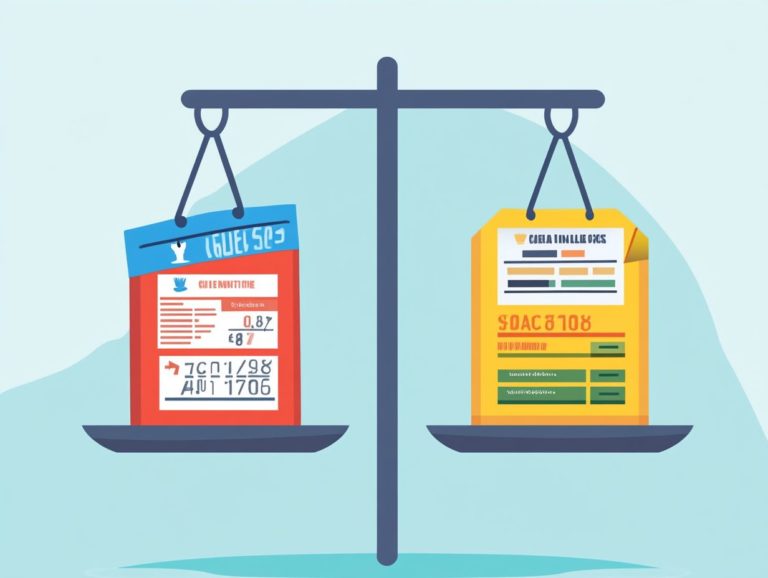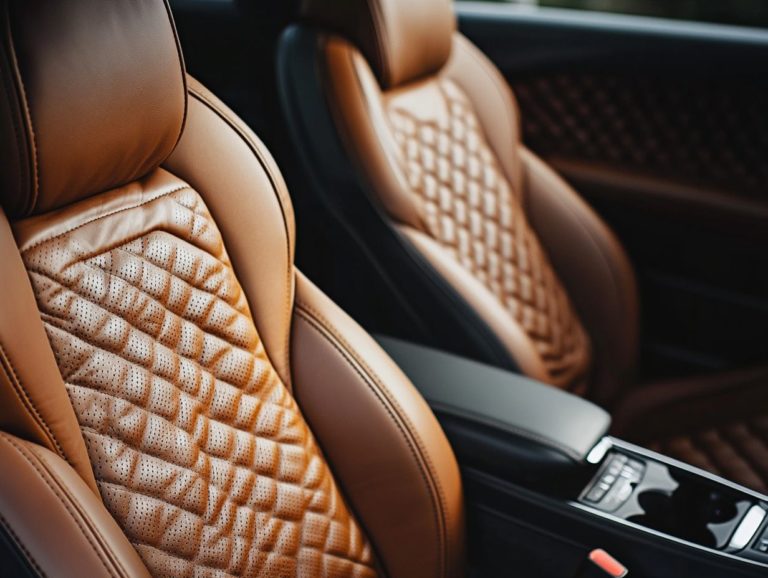Comparing Cargo Space: Sedans vs. Hatchbacks
When selecting a vehicle, the importance of cargo space cannot be overstated; it often becomes a key factor in your decision-making process.
Sedans and hatchbacks have unique advantages and drawbacks in dimensions and capacity. Each type caters to specific needs.
This article delves into the cargo space offered by both vehicle types, illuminating their respective pros and cons.
It also examines essential factors tailored to your personal requirements and preferences, empowering you to make a well-informed choice for your next vehicle.
Contents
- Key Takeaways:
- Cargo Space in Sedans
- Cargo Space in Hatchbacks
- Pros and Cons of Hatchbacks
- Factors to Consider When Choosing Between Sedans and Hatchbacks
- Frequently Asked Questions
- How does the cargo space in a sedan compare to that of a hatchback?
- Can a hatchback carry more cargo than a sedan?
- Why do some people prefer sedans over hatchbacks for cargo transportation?
- Are there any advantages to choosing a hatchback over a sedan in terms of cargo space?
- Are there any types of cargo that are better suited for sedans over hatchbacks?
- Do hatchbacks have any disadvantages when it comes to cargo space?
Key Takeaways:
Here are some key points to keep in mind when choosing between a sedan and a hatchback.
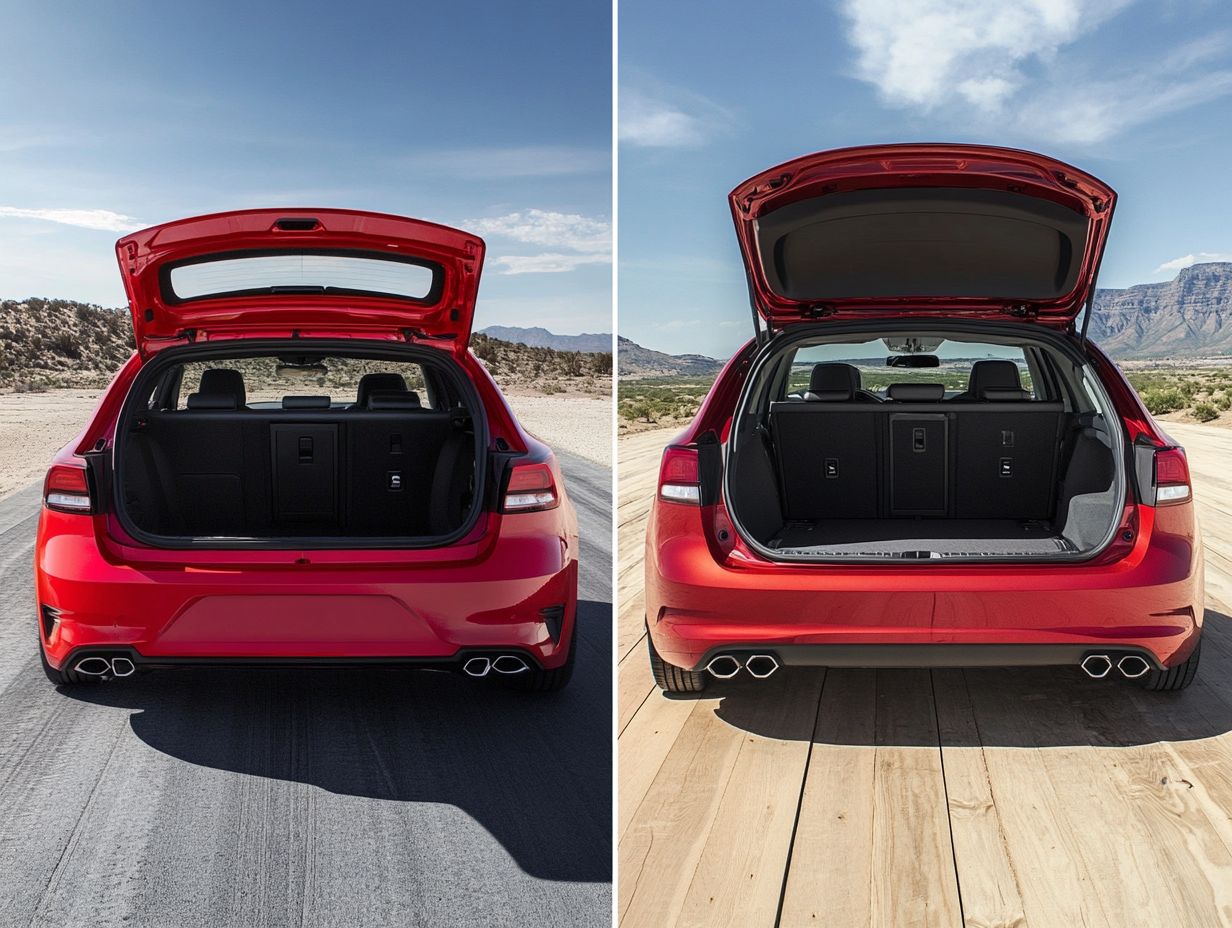
- Sedans might have larger cargo space than hatchbacks, but they lack the flexibility that hatchbacks provide.
- Consider your personal needs and preferences when choosing between a sedan and a hatchback, as well as practical factors like the types of items you need to transport.
- While hatchbacks may have less cargo space, their compact size and folding seats make them a more practical choice for everyday use and city driving.
Explanation of Vehicle Types
Understanding the differences between vehicle types is crucial for making an informed choice that perfectly fits your driving needs.
In the automotive market, two popular options are hatchbacks and sedans, each offering distinct advantages and disadvantages shaped by their design, passenger comfort, and storage capacity.
Hatchbacks, with their compact sizes and versatile cargo areas, are ideal for those who value flexibility.
In contrast, sedans emphasize spacious interiors and fuel efficiency, catering to different lifestyle choices that can significantly influence your driving experience.
If you re navigating city streets, hatchbacks are unbeatable champions with their nimble handling and smaller footprint, making parking in tight spots a breeze.
On the flip side, sedans are perfect for those seeking a harmonious blend of comfort and style, providing a smoother ride with generous legroom for passengers.
While hatchbacks excel in practicality, allowing for easier access to cargo, sedans typically showcase a more polished aesthetic, making them appealing for both business and leisure.
Understanding these details helps you choose the right vehicle and enhances your daily driving experience, accommodating a wide range of preferences and practical needs.
Cargo Space in Sedans
When you contemplate a sedan, cargo space emerges as a key factor that shapes both practicality and your overall driving experience.
Sedans generally boast a generously sized trunk, designed carefully to provide ample storage capacity.
This makes them exceptionally suited for daily commutes, family getaways, and the demands of urban driving.
The smart use of space often improves fuel efficiency, amplifying the vehicle’s allure for those conscious of their environmental footprint.
By grasping the dimensions and capacity of a sedan’s cargo area, you’ll be better equipped to assess how well a particular model aligns with your needs for passenger comfort and utility.
Dimensions and Capacity
The dimensions and capacity of sedan cargo spaces can vary significantly across different models, greatly impacting their usability for you.
Take the Honda Civic, for example; its spacious trunk provides ample room for groceries and luggage, making it a practical choice for your everyday needs.
In contrast, the Toyota Corolla offers competitive cargo space tailored for convenience, ensuring you don’t have to compromise on your storage requirements.
Consider the Mazda3, which boasts an agile design and a cargo capacity of around 20.1 cubic feet.
It strikes the perfect balance between sporty aesthetics and practicality, catering to your desire for both style and functionality.
On the flip side, the Hyundai Elantra offers about 14.2 cubic feet of trunk space. While slightly smaller, it still accommodates your daily essentials with ease.
These dimensions directly influence not only how much you can carry but also how comfortable the interior feels during longer journeys.
When evaluating these models, it’s evident that cargo dimensions play a crucial role in enhancing passenger comfort and shaping your overall driving experience, providing you with valuable insights as a potential buyer.
Pros and Cons
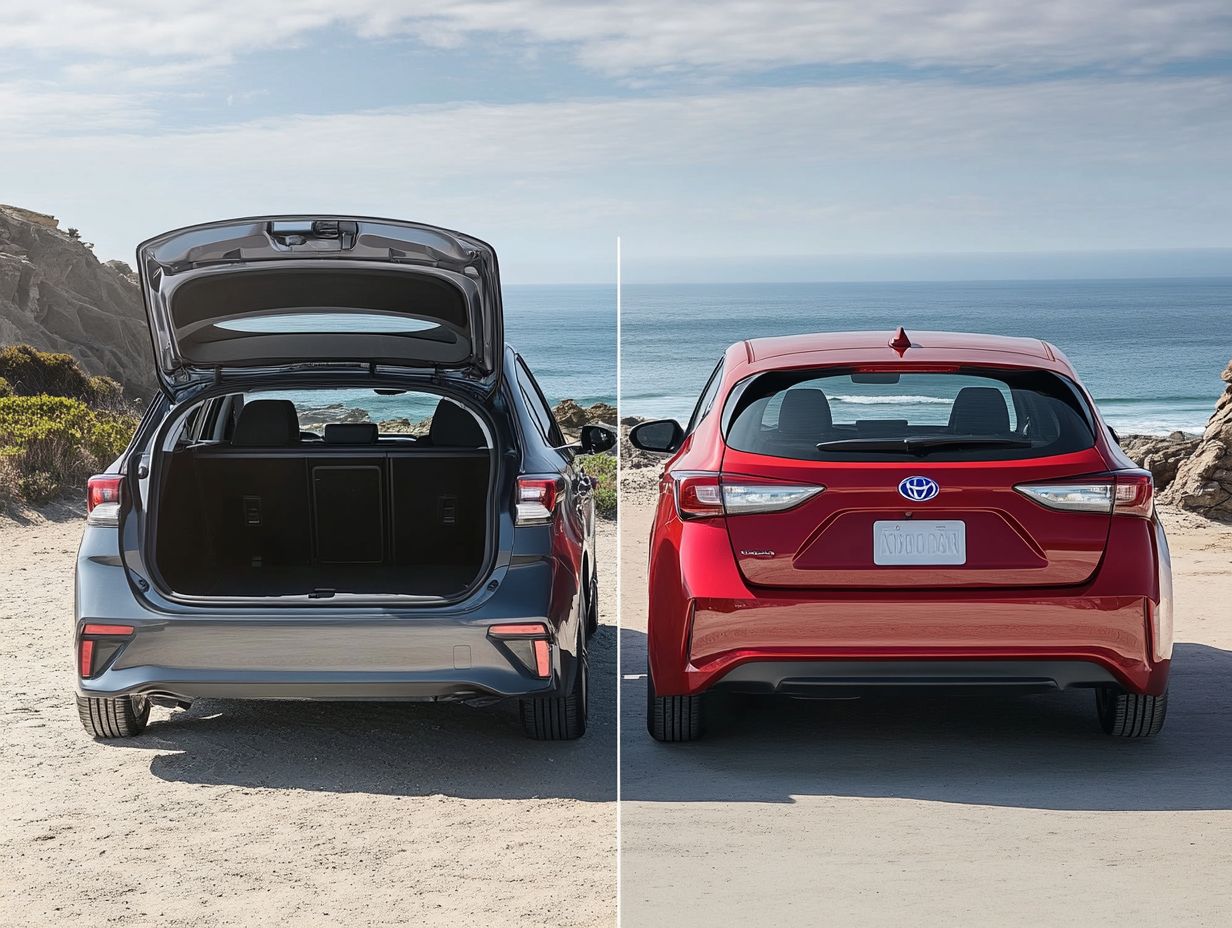
When weighing the pros and cons of sedans, you ll find several key factors to consider, such as fuel economy, safety features, and resale value.
On the upside, sedans typically boast impressive fuel efficiency, making them a smart choice for your daily commutes. Many models, like the Subaru Impreza, come equipped with advanced safety technology, greatly improving safety for passengers.
However, it s crucial to acknowledge some drawbacks. For instance, certain sedans may offer limited cargo space compared to SUVs, which can be less practical for families or those with substantial transport needs.
While many sedans shine in fuel economy, some high-performance versions, such as the Honda Accord Sport, might prioritize power over efficiency.
The importance of resale value should not be overlooked; sedans from reputable brands often retain their worth, making them attractive to budget-conscious buyers.
Ultimately, grasping these nuances enables you to make informed decisions tailored to your unique lifestyle and preferences.
Cargo Space in Hatchbacks
Hatchbacks are celebrated for their versatile cargo space, featuring an easily accessible trunk area that elevates practicality for diverse driving experiences. Unlike traditional sedans, hatchbacks such as the Kia Forte5 and Toyota Prius offer a distinct advantage with their more generous trunk and passenger compartments.
This design allows for greater adaptability when transporting goods or luggage. Such versatility proves especially advantageous for urban drivers who navigate bustling city landscapes, balancing efficient maneuverability with substantial storage capacity.
Dimensions and Capacity
The dimensions and cargo capacity of hatchbacks can greatly impact their overall usability and design. Take the 2024 Mazda3 and Hyundai Elantra, for example. These models highlight smart design that maximizes cargo space without sacrificing passenger comfort, making them perfect for your diverse driving needs.
This thoughtful design allows hatchbacks to strike a harmonious balance between compact size and spacious trunk functionality.
With their shorter lengths, hatchbacks typically offer more versatile cargo space, especially when you fold down the rear seats. This feature enhances their practicality for everything from daily errands to longer journeys.
For instance, the Mazda3 provides about 20.1 cubic feet of cargo capacity, while many sedans in the same class, like the Hyundai Elantra, hover around 14.2 cubic feet. This clear distinction demonstrates how hatchbacks can easily accommodate larger items, be it groceries or sports gear, while still offering a comfortable cabin for passengers—highlighting the differences noted in a feature comparison of sedans vs. SUVs.
As a result, if you prioritize flexibility and convenience in your vehicle choice, hatchbacks may just be the ideal option for your everyday lifestyle.
Pros and Cons of Hatchbacks
Evaluating the pros and cons of hatchbacks brings to light several distinct advantages, such as enhanced visibility and versatile cargo space, along with certain drawbacks. The compact size of hatchbacks, like the Honda Civic hatchback, often gives you a maneuverability edge in urban settings, leading to a more enjoyable driving experience.
It s important for you to consider factors like road noise and how this choice might affect resale value. Hatchbacks generally offer a more unobstructed rear view thanks to their larger rear windows compared to sedans. This feature makes navigating tight parking spots much easier for you.
The adaptable cargo space in hatchbacks allows for greater flexibility in loading options, which is perfect if you lead an active lifestyle or need to transport larger items much more convenient than the static trunks found in sedans.
However, while hatchbacks can be a blast to drive with their sporty handling, they might sacrifice some ride comfort, which sedans usually provide with a smoother experience on longer journeys. By balancing these factors, you can better determine which type truly meets your needs.
Factors to Consider When Choosing Between Sedans and Hatchbacks
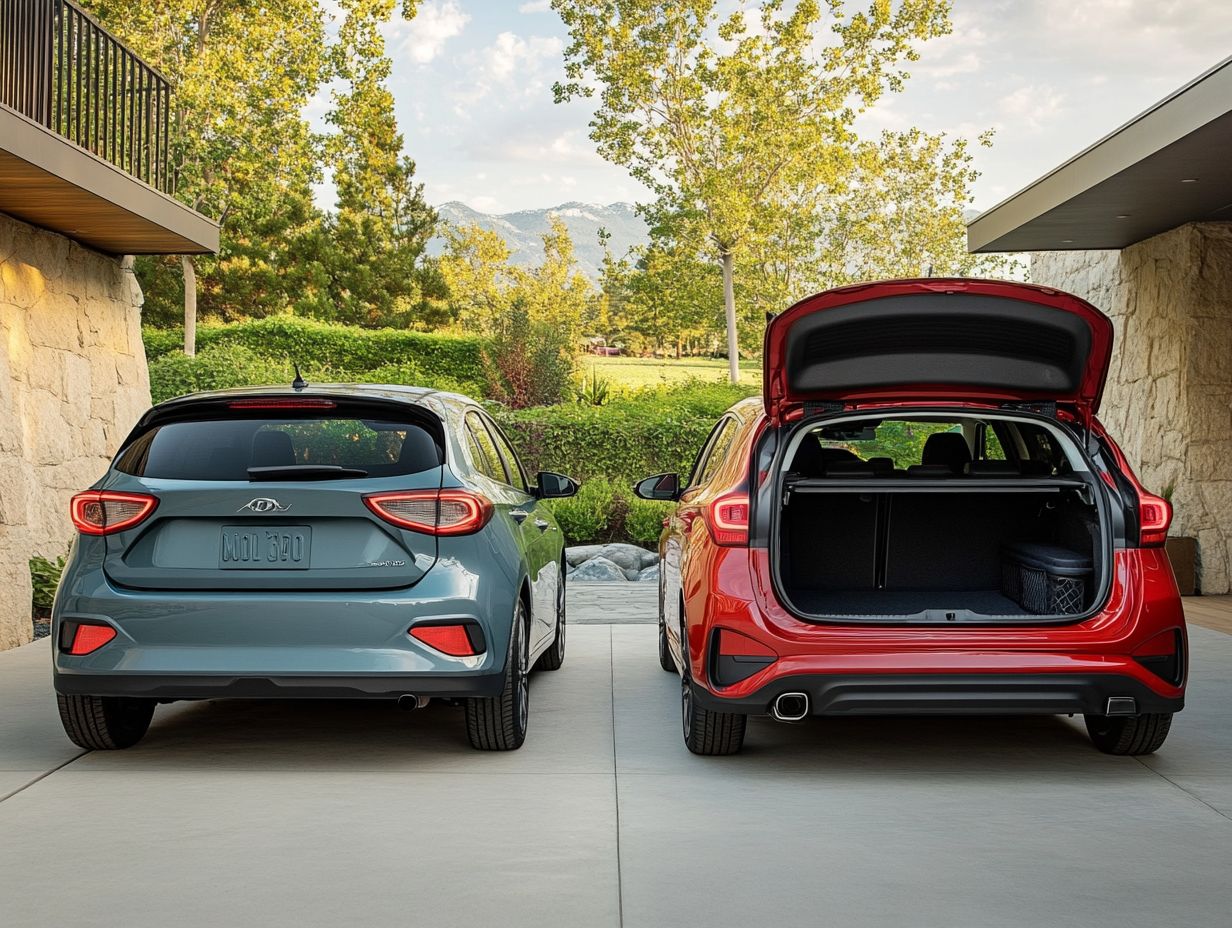
When choosing between sedans and hatchbacks, you ll want to consider a few key factors that align with your personal needs and driving habits.
For instance, hatchbacks might provide you with superior cargo space and versatility, ideal for an active lifestyle. On the other hand, sedans typically shine in passenger comfort and fuel economy, making them a great fit if you prioritize long commutes or road trips. To explore the differences further, check out this feature comparison: coupe vs. sedan.
Understanding these differences is essential for selecting the vehicle that seamlessly complements your lifestyle choices.
Personal Needs and Preferences
Your personal needs and preferences are important when choosing between a sedan and a hatchback. If you require ample cargo space for family outings or sports gear, a hatchback like the Subaru Impreza may be the perfect fit.
On the other hand, if fuel economy and passenger comfort are your priorities, you might find that a sedan model, such as the Toyota Corolla, suits you better.
Your lifestyle choices also play a significant role in this decision. If you reside in the city and frequently navigate tight streets, a compact hatchback could be your go-to for its maneuverability and practicality, making parking a breeze.
Conversely, if long road trips are more your style, you might gravitate towards a spacious sedan, where extended legroom and a larger trunk for luggage enhance your travel experience.
Ultimately, your driving habits and daily scenarios whether embarking on weekend getaways or commuting through bustling traffic will help you choose between these two versatile vehicle types. Now is the perfect time to evaluate your driving habits against these options.
Additional Factors to Consider
Your personal needs are just one part of the decision. Several other factors will influence your choice between sedans and hatchbacks. Think about safety features, environmental impact, and resale value.
For instance, hatchbacks often offer better visibility and may come with advanced safety technology, boosting your confidence while navigating urban environments.
On the flip side, sedans typically boast a more robust structure, which helps achieve higher safety ratings in crashes that can provide reassurance for buyers like you.
As environmental concerns gain traction, both vehicle types are evolving to include eco-friendly options, such as hybrids and electric models. Hybrids combine a traditional engine with electric power, while electric models run entirely on electricity. These innovations not only appeal to your eco-conscious side but can also enhance resale value as the market increasingly leans towards greener vehicles.
Finding the right balance between practicality and sustainability in either vehicle type offers you a variety of choices to meet your needs while addressing broader market trends.
Frequently Asked Questions
Here are some common questions about sedans and hatchbacks.
How does the cargo space in a sedan compare to that of a hatchback?
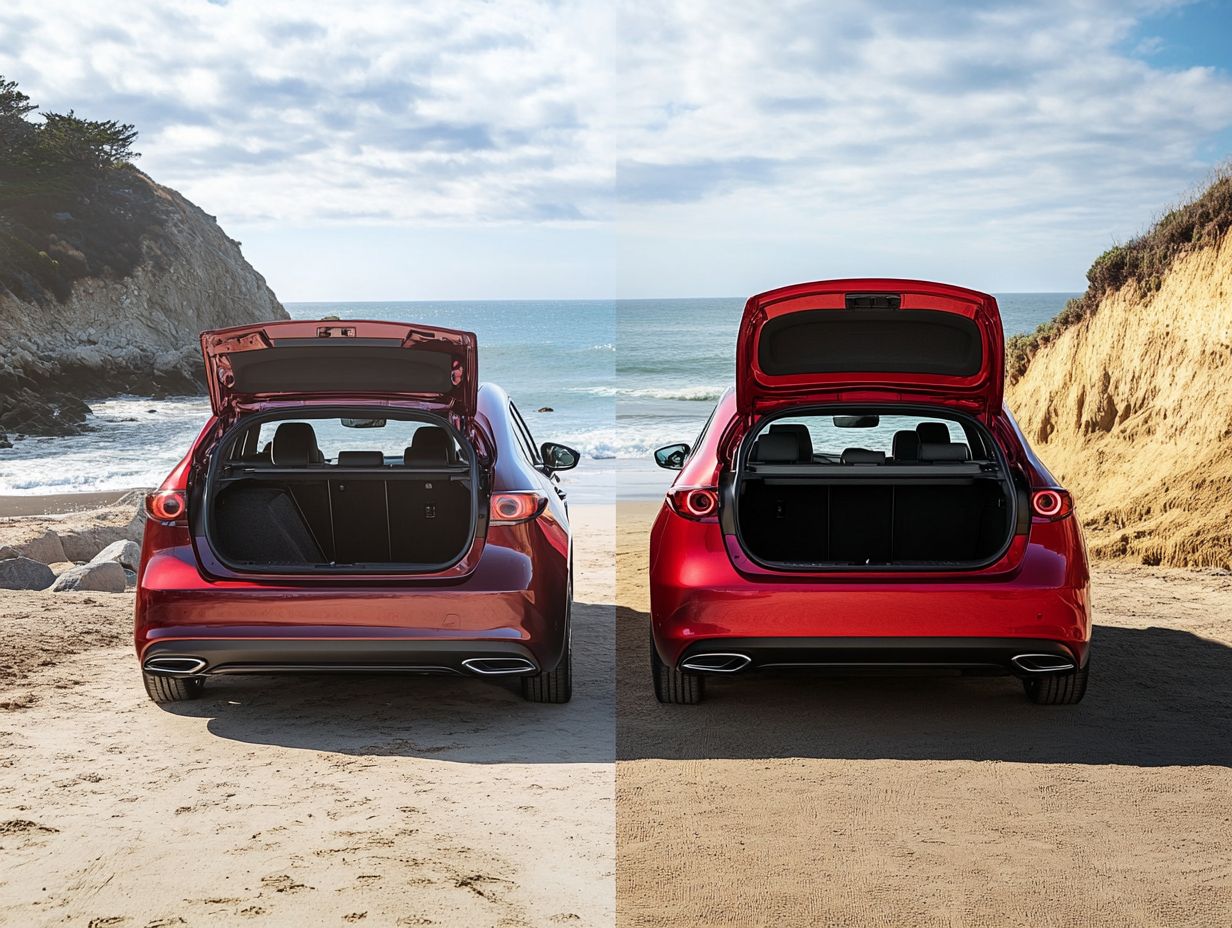
The cargo space in a sedan is typically located in the trunk, which tends to be smaller and more confined compared to the spacious cargo area in a hatchback.
Can a hatchback carry more cargo than a sedan?
Yes, a hatchback can generally carry more cargo than a sedan due to its larger and more versatile storage area.
Why do some people prefer sedans over hatchbacks for cargo transportation?
Some people prefer sedans because they offer a more traditional and sleek look, and may have better fuel efficiency compared to hatchbacks.
Are there any advantages to choosing a hatchback over a sedan in terms of cargo space?
Yes, hatchbacks offer more flexibility in terms of cargo transportation as the rear seats can often fold down to create even more space for larger items.
Are there any types of cargo that are better suited for sedans over hatchbacks?
Sedans may be better for transporting smaller, compact items due to the more limited space in the trunk.
Do hatchbacks have any disadvantages when it comes to cargo space?
One potential disadvantage is that the open cargo area in a hatchback may not provide as much protection for items compared to a trunk in a sedan.
Explore sedans and hatchbacks available at local dealerships or online to find the perfect vehicle for your needs!



